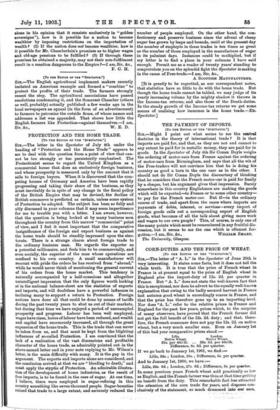PROTECTION AND THE HOME TRADE.
[TO THE EDITOR OF THE "SPECTATOR."]
SIR,—The letter in the Spectator of July 4th under the heading of "Protection and the Home Trade" appears to me to deal with the question from a point of view that can- not be too strongly or too persistently emphasised. The Protectionist seems to regard the United Kingdom as a commercial house that does an exclusively foreign business, and whose prosperity is measured only by the amount that it sells to foreign buyers. When it is discovered that the com- peting houses of Germany and America have been rapidly progressing and taking their share of the business, as they must inevitably do in spite of any change in the fiscal policy of the British Empire that may be devised, the decline of British commerce is predicted as certain, unless some system of Protection be adopted. The subject has been so fully and ably discussed in your columns that it may seem impertinence for me to trouble you with a letter. I am aware, however, that the question is being looked at by many business men throughout the country from this narrow "commercial" point of view, and I feel it most important that the comparative insignificance of the foreign and export business as against the home trade should be steadily impressed upon the elec- torate. There is a strange charm about foreign trade to the ordinary business man. He regards the exporter as a potential millionaire, and feels him to be commercially, and even socially, the superior of the man whose operations are confined to his own country. A small manufacturer will recount with pride the orders he has received from " abroad," while he would never think of mentioning the general current of his orders from the home market. This tendency is naturally accompanied by a half-conscious and altogether unintelligent impression that the only figures worth looking at in the national balance-sheet are the statistics of exports and imports, and will doubtless have a powerful influence in inclining many to support a return to Protection. Foreign nations have done all that could be done by means of tariffs during the past twenty years to shut us out of their markets, but during that time we have enjoyed a period of unexampled prosperity and progress. Labour has been well employed, wages have risen, hours of labour have been reduced, and wealth and capital have enormously increased, all through the great expansion of the home trade. This is the trade that can never be taken from us, and that must be kept from the blighting influences of so-called Protection. I am convinced that the lack of a realisation of the vast dimensions and profitable character of the home trade, as admirably pointed out in the above-named letter and in your note replying to Mr. Wilson's letter, is the main difficulty with many. It is the gap in the argument. The exports and imports alone are considered, and the conclusion arrived at that we are " bleeding to death," and must apply the styptic of Protection. An admirable illustra- tion of the development of home industries, as the result of free imports, is to be found in the case of sugar. At one time, I believe, there were employed in sugar-refining in this country something like seven thousand people. Sugar-bounties ruined that trade to a large extent, and seriously reduced the number of people employed. On the other hand, the con- fectionery and preserve business since the advent of cheap sugar has grown by leaps and bounds, until at the present day the number of employes in these trades is ten times as great as the number of those employed in the manufacture of sugar in its palmiest days. Instances could be multiplied, but if my letter is to find a place in your columns I have said enough. Permit me as a reader of twenty years standing to congratulate you on the splendid fight the Spectator is making in the cause of Free-trade.—I am, Sir, &c.,
A SCOTTISH MANUFACTURER.
[It is greatly to be regretted, as our correspondent notes, that statistics have so little to do with the home trade. But though the home trade cannot be tabled, we may judge of its yearly increasing volume by the mighty shadow it throws in the Income-tax returns, and also those of the Death-duties. In the steady growth of the Income-tax returns we get some means of realising how immense is the home trade.—ED. Spectator.]






































 Previous page
Previous page